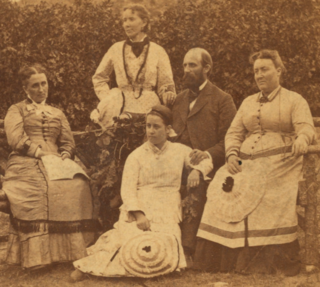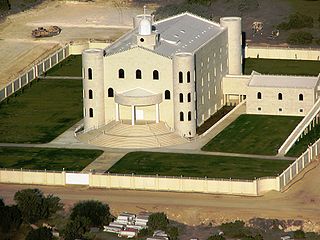
Polygyny is a form of polygamy entailing the marriage of a man to several women. The term polygyny is from Neoclassical Greek πολυγυνία (polugunía); from Ancient Greek πολύ (polú) 'many' and γυνή (gunḗ) 'woman, wife'.
Polygamy is the practice of marrying multiple spouses. When a man is married to more than one wife at the same time, it is called polygyny. When a woman is married to more than one husband at the same time, it is called polyandry. In sociobiology and zoology, researchers use polygamy in a broad sense to mean any form of multiple mating.

Polygamy was practiced by leaders of the Church of Jesus Christ of Latter-day Saints for more than half of the 19th century, and practiced publicly from 1852 to 1890 by between 20 and 30 percent of Latter-day Saint families.

The Fundamentalist Church of Jesus Christ of Latter-Day Saints is a religious sect of the fundamentalist Mormon denominations whose members practice polygamy. It is variously defined as a cult, a sect, or a new religious movement. The organization has been involved in various illegal activities, including child marriages, child abandonment, sexual assault, and human trafficking including child sexual abuse. The sect is not connected to The Church of Jesus Christ of Latter-day Saints, the largest Latter-day Saint denomination.

Mormon fundamentalism is a belief in the validity of selected fundamental aspects of Mormonism as taught and practiced in the nineteenth century, particularly during the administrations of Joseph Smith, Brigham Young, and John Taylor, the first three presidents of the Church of Jesus Christ of Latter-day Saints. Mormon fundamentalists seek to uphold tenets and practices no longer held by mainstream Mormons. The principle most often associated with Mormon fundamentalism is plural marriage, a form of polygyny first taught in the Latter Day Saint movement by the movement's founder, Smith. A second and closely associated principle is that of the United Order, a form of egalitarian communalism. Mormon fundamentalists believe that these and other principles were wrongly abandoned or changed by the LDS Church in its efforts to become reconciled with mainstream American society. Today, the LDS Church excommunicates any of its members who practice plural marriage or who otherwise closely associate themselves with Mormon fundamentalist practices.

Marriage law is the body of legal specifications and requirements and other laws that regulate the initiation, continuation, and validity of marriages, an aspect of family law, that determine the validity of a marriage, and which vary considerably among countries in terms of what can and cannot be legally recognized by the state.
Polygamy is the practice of having more than one spouse at the same time. Specifically, polygyny is the practice of one man taking more than one wife while polyandry is the practice of one woman taking more than one husband. Polygamy is a common marriage pattern in some parts of the world. In North America, polygamy has not been a culturally normative or legally recognized institution since the continent's colonization by Europeans.
Polygamy is "the practice or custom of having more than one wife or husband at the same time." Polygamy has been practiced by many cultures throughout history.

Joseph Smith, the founder of the Latter Day Saint movement, privately taught and practiced polygamy. After Smith's death in 1844, the church he established splintered into several competing groups. Disagreement over Smith's doctrine of "plural marriage" has been among the primary reasons for multiple church schisms.

Polygamy, including polygyny, is outlawed in India. While it was not prohibited in Ancient India and was common among aristocrats and emperors, it is believed that it was not a major cultural practice. The lack of prohibition was in part due to the separation between land laws and religion, and partially since all of the major religions of India portrayed polygamy in a neutral light.

Under civil law, Nigeria does not recognize polygamous unions. However, 12 out of the 36 Nigerian states recognize polygamous marriages as being equivalent to monogamous marriages. All twelve states are governed by Sharia law. The states, which are all northern, include the states of Bauchi, Borno, Gombe, Jigawa, Kaduna, Kano, Katsina, Kebbi, Niger, Sokoto, Yobe, and Zamfara which allows for a man to take more than one wife.
Polygamy is legal in Uganda, where a man is allowed to marry multiple wives at a time. Due to this, most families tend to contain an abundance of children.
The Republic of Afghanistan, which is an Islamic Republic under Sharia Law, allows for polygyny. Afghan men may take up to four wives, as Islam allows for such. A man must treat all of his wives equally; however, it has been reported that these regulations are rarely followed. While the Qur'an states that a man is allowed a maximum of four wives, there is an unspecified number of women allowed to be his 'concubines'. These women are considered unprotected and need a man as a guardian.
The legal status of polygamy varies widely around the world. Polygamy is legal in 58 out of nearly 200 sovereign states, the vast majority of them being Muslim-majority countries. Some countries that permit polygamy have restrictions, such as requiring the first wife to give her consent.
Polygamy is not legally recognised in Australia. Legally recognised polygamous marriages may not be performed in Australia, and a person who marries another person, knowing that the previous marriage is still subsisting, commits an offence of bigamy under section 94 of the Marriage Act 1961, which carries a maximum penalty of 5 years imprisonment. However, the offence of bigamy only applies to attempts to contract a legally recognised marriage; it does not apply to polygamous marriages where there is no attempt to gain recognition for the marriage under Australian law. Whether or not either or both partners were aware of the previous subsisting marriage, the second marriage is void. Foreign polygamous marriages are not recognized in Australia. However, a foreign marriage that is not polygamous but could potentially become polygamous at a later date under the law of the country where the marriage took place is recognized in Australia while any subsequent polygamous marriage is not. While under Australian law a person can be in at most one legally valid marriage at a time, Australian law does recognise that a person can be in multiple de facto relationships concurrently, and as such entitled to the legal rights extended to members of de facto relationships.
Polygamy is illegal in Ghana, but the restrictions are not heavily enforced. Polygamous marriages are illegal under civil law, though are arguably considered to be legal under customary law. Despite these exceptions, there have been no reports of a legally contracted polygamous marriage in Ghana; and are considered to be "de facto" illegal. An estimated 22% of Ghanaian women live polygamously.

Sister Wives is an American reality television series broadcast on TLC that premiered on September 26, 2010. The show documents the life of a polygamist family, which includes Kody Brown, his wife Robyn, ex-wives Meri, Janelle, and Christine, and their 18 children. The family began the series living in Lehi, Utah, moved to Las Vegas in 2011, and to Flagstaff, Arizona, in mid-2018.
Polygamy in Guinea is generally illegal. Polygamy is regulated under the new 2019 family law. The new regulations stipulate that a marriage is presumed to be monogamous; however a couple may legally enter into a polygynous marriage if the groom declares that he is opting for polygyny during the marriage ceremony and the bride gives "explicit consent". The new law is the result of a long legislative battle between those who wanted free polygamy without restrictions and those who wanted a complete ban.
Polygamy is prohibited under Sierra Leone’s penal code. Polygamy is authorized in customary marriages, where a man can take as many wives as he wishes.
Polygamy in Africa has existed throughout the history of Africa. Polygamy, particularly polygyny, is a highly valued social institution in Africa. Polygamy is a marriage between a man or woman and their multiple spouses. Polygyny is a marriage between a man and multiple wives. Polyandry is a marriage between a woman and multiple husbands. A common expectation for African kings in African societies is for African kings to symbolically unify his kingdom and the society through partaking in polygamous marriages with wives from a broad range of clans within the society. By doing so, the king reduces the chance of dissident and rival forces developing and rising against him.








